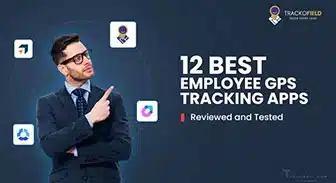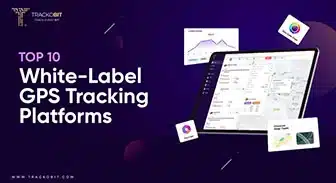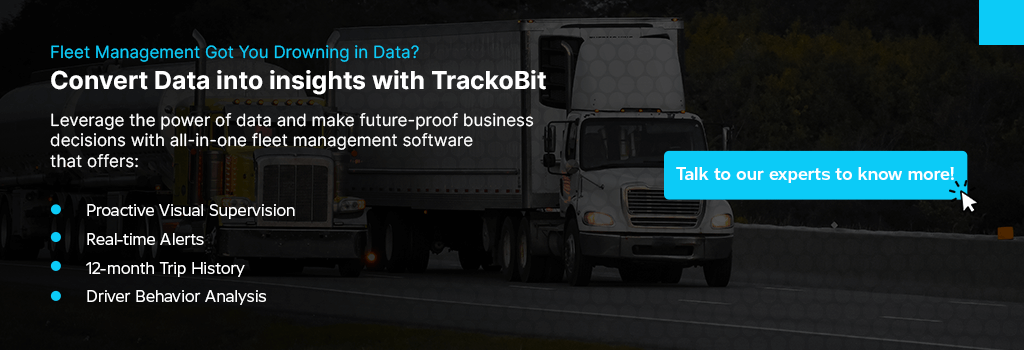-
TrackoBit
Manage commercial vehicles with the new-age Fleet Management Software
TrackoBit -
TrackoField
Streamline your scattered workforce with Field Force Management Software
TrackoField -
Features Resources
-
Blog
Carefully curated articles to update you on industrial trends. -
White Paper
Insightful papers and analysis on essential subject matters. -
Glossary
Explore an alphabetical list of relevant industry terms. -
What’s New
Get TrackoBit & TrackoField monthly updates here. -
Case Study
Explore the cases we solved with our diverse solutions. -
Comparisons
Compare platforms, features, and pricing to find your best fit.
-
About Us
Get to know TrackoBit: our team, ethos, values, and vision. -
Careers
Join the most dynamic cult of coders, creatives and changemakers. -
Tech Support
Learn about our technical support team and services in detail. -
Events
Check out the exhibitions where we left our marks and conquered. -
Contact Us
Connect with us and let us know how we can be of service.
The Top 7 Fleet Management Challenges – TrackoBit
- Author:Anvesha Pandey
- Read Time:8 min
- Published:
- Last Update: October 13, 2025
Table of Contents
Toggle
Learn the ins and outs of the top 7 fleet management challenges. Along with the solutions to cater these solutions.
Table of Contents
Toggle
Juggling between tracking vehicles, ensuring driver safety and planning routes can be a nightmare for fleet managers responsible for hundreds of vehicles. Talking of challenges? With rising demand and competition at the same time, they don’t seem to end.
But what if we tell you that “Modern Fleet Management Technologies” can simplify your daily fleet operations? Telematics and GPS tracking (that goes beyond just pinpointing the location of the vehicles) provide valuable insights that boost productivity, minimize accidents, and safeguard your bottom line.
That’s not all as the systems allow you to gain access to real-time visibility of the fleet that empowers you to make more informed decisions. Fleet management systems tackle the biggest obstacles impacting your profit margins, operational efficiency, and safety.
So, why wait, let’s get into this piece to learn a little more about the top 7 fleet management challenges and how fleet management software can help you curb all these obstacles.
Top 7 Fleet Management Challenges
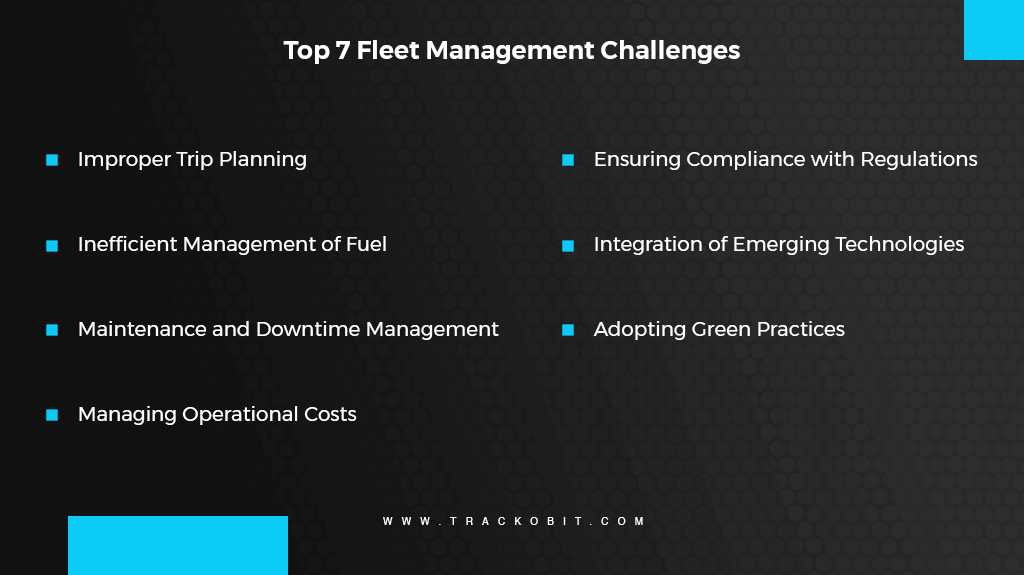
1. Trip Planning – Lost in Transit
On-time deliveries are very important for business. Constantly taking longer routes, rerouting frequently, and having unplanned stops leads to delayed deliveries and frustrated clients.
Additionally, micromanaging drivers with phone calls to check their routes is not only time-consuming but also disrupts their focus. This inefficient approach further leads to wasted driving time, increased fuel costs, and potential driver overtime expenses.
Here’s the solution to overcome this challenge-
An ideal route planning solution comes to rescues in such situations. The solution helps in planning and creating better and more efficient trips. Not just planning, creating, and managing trips but fleet managers can set predetermined stops, set virtual boundaries aka geofences, and set times for halts.
According to a report by ABI Research, implementing advanced vehicle tracking and route optimization technologies can reduce fleet travel times by up to 20%.
2. Inefficient Management of Fuel – Fueling the Fire
Fuel costs amount to a significant part of fleet expenses. Inefficient fuel management in addition to poor driving habits, broken route planning, and inadequate vehicle management can add up more to the cost and make things worse.
Other than inconsistently rising fuel prices, fuel theft is another big challenge prevailing globally across the sector.
Time to upgrade your fleet management software!
Say goodbye to downtime, inaccurate data, and latency. Sign up for data-driven decision-making and unmatched growth with TrackoBit
Here’s the solution to overcome this challenge-
A dedicated fuel management software that minutely monitors fuel consumption becomes really important. Having detailed reports on each vehicle’s fuel usage and fuel refill allows businesses to have deep insights into fuel consumption patterns. Real-time alerts notify planned/unplanned fuel refills or fuel ejection enhancing visibility.
Although one has no control over fluctuating fuel prices, several practices like regular vehicle maintenance, driver training programs, and fuel monitoring systems can help improve fuel economy.
- Additionally, smart fuel management systems send alerts or notifications in cases of excessive consumption of fuel. This allows managers to know the actual reason( aggressive driving, idling, or malfunctioning) behind this excessive consumption.
3. Maintenance and Downtime Management – Breakdowns on the Highway
Regular maintenance is essential to keep vehicles in good working condition and also to prevent unexpected breakdowns. However, managing maintenance schedules and minimizing vehicle downtime can be challenging especially when done manually. Even the slightest misalignment of the wheel can lead to hazardous situations. Manual tracking can result in missed maintenance deadlines and extended downtimes, impacting fleet efficiency and safety.
Here’s the solution to overcome this challenge-
Implementing a proactive maintenance schedule and using telematics to monitor vehicle performance can help prevent these issues. The system shoots alerts whenever the vehicle needs repair. Additionally, with DVIRs (Driver vehicle inspection reports) drivers of the fleet can update the need for repair or maintenance required by the vehicles, bringing preventive maintenance into action.
Learn more on DVIR – DVIR: A Key Tool for Mitigating Fleet Downtime
4. Managing Operational Costs – Balancing the Books
Managing the overall cost of the business to draw as much profit as possible is fundamental to any business. A commercial fleet’s operational cost covers the largest portion of your fleet expenses like fuel, maintenance, insurance, and administrative expenses. The cost directly impacts profitability and areas of budgeting.
Managing the operation not only becomes important in cutting costs down but also provides you with a complete analysis of the fleet operations and helps managers focus on areas of improvement such as fleet efficiency, driver behavior, CO2 emissions, and more.
Here’s the solution to overcome this challenge-
Here’s where you can see the magic of fleet management software as the software helps you identify operational anomalies that’ll help you reduce your overall operational costs – with up to a 20% decrease in fuel and maintenance expenses and up to a 10% decrease in insurance premiums.
5. Ensuring Compliance with Regulations – Safety First
Fleet managers must ensure that their operations comply with various local, state, and federal regulations. These regulations can include driver hours of service (HOS), AIS140 compliance vehicle safety standards, environmental regulations, and more. Non-compliance can result in heavy fines and legal issues.
Additionally, some in-cabin driver activities like not wearing seat belts, drunk driving, and smoking can cause some run-time irregularities.
Here’s what you can do:
Opting for software that is compatible with compliances like ELD Compliances, AIS140, and more is one of the ways to meet various rules. Additionally, to keep an eye on the in-cabin activities of drivers, managers can leverage video telematics solutions. With the help of DMS (Driver Monitoring System), managers are notified whenever drivers indulge in any non-compliant activity like
- Smoking
- Distracted Driving
- Not wearing seatbelt
6. Integration of Emerging Technologies – Tech Tango
The rapid advancement of technology offers many opportunities for improving fleet management, such as integrating AI and machine learning, eclectic vehicles, and autonomous vehicles.
However, integrating these new technologies into existing systems can be challenging due to a lack of technical information. Fleet managers must stay informed about the latest technological advancements and strategically implement them to enhance efficiency without disrupting operations.
Here’s the solution to overcome these challenges
Opting for user-friendly platforms that are easy to understand and scalable. Also learning the right way to use data becomes very mandatory as using the data in an organized manner makes use of significant amounts of telemetry data, which delivers long-term cost advantages.
7. Adopting Green Practices – Adopting Green Practices
With increasing environmental concerns, adopting green practices is becoming more important for the fleet industry. This includes reducing carbon emissions, using alternative fuels (CNG, natural gas, coal-derived liquid fuel, etc.), and improving fuel efficiency.
Implementing eco-friendly practices can be challenging due to the initial costs and required changes in operations. However, these practices can lead to long-term cost savings.
Here’s the solution to over these challenges
This challenge can be catered to by adopting electric vehicles and reducing CO2 emissions, but managing a fleet of EVs is another helluva task. However, with an ideal electric vehicle fleet management system you can keep insight into the battery health of your vehicle with SOC monitoring and live-voltage tracking to optimize routes, avoid downtime, and gain valuable insights.
Additionally, a driver behaviour management system comes into action by keeping an eye on the driving techniques of the driver in order to minimize idling, ensure smooth driving, and follow efficient driving.
What are the Challenges Faced by Fleet Managers?
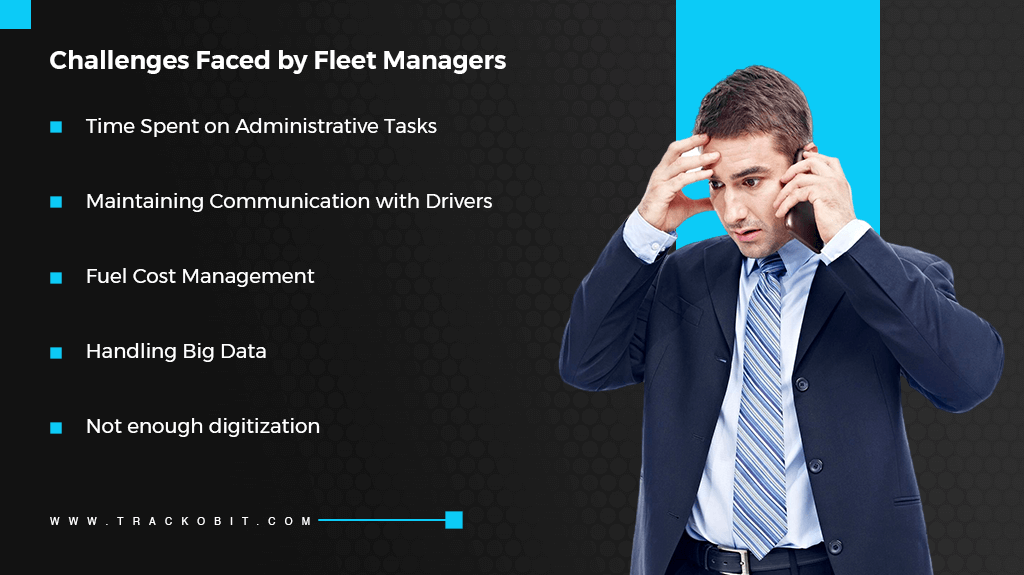
The fleet market is undergoing significant changes driven by advancements in technology, evolving regulations, and shifts in economic conditions. Fleet managers face several critical challenges that impact their operations and decision-making.
1. Time Spent on Administrative Tasks
Time is precious and it’s no different for fleet managers. Fleet managers spend a considerable amount of time on administrative tasks such as vehicle registration, compliance documentation, and maintenance scheduling. This can detract from their ability to focus on strategic planning and optimization.
Some recent studies state that fleet managers spend up to 40% of their time on administrative tasks, which could otherwise be allocated to more important activities.
2. Maintaining Communication with Drivers
Communication is the key to operating in a remote team, we all know that. Effective conversation with drivers is essential for ensuring smooth operations, safety, and compliance. However, maintaining consistent and clear communication can be challenging, especially for fleets with drivers dispersed over large geographic areas.
According to a recent report, poor communication is a common issue, affecting 30% of fleet operations.
3. Fuel Cost Management
Managing fuel costs remains a significant challenge due to fluctuating fuel prices. Recent studies state that the average cost of fuel in the U.S. has risen by approximately 35% over the past year, directly impacting fleet operating expenses.
This increase exerts more pressure on fleet managers to seek more fuel-efficient vehicles and optimize routes to control costs.
4. Handling Big Data
The integration of telematics and other advanced technologies generates vast amounts of data. Do you feel having ample data (including data on fuel, driver behavior, and more) is enough? Obviously not! Making the right use of all these pieces of information is equally important.
Fleet managers must analyze this data to make informed decisions about vehicle maintenance, driver behavior, and trip planning. However, putting the insights and data to the right is a skill, that only a few possess.
According to a study by Frost & Sullivan, only 30% of fleet managers feel fully equipped to handle and utilize big data effectively.
5. Not enough digitization
Despite the potential benefits, many fleet operations have not fully embraced digitization. Manual processes still dominate because people might find it difficult to work with the technology as a result manual processes can lead to inefficiencies and errors.
A report by McKinsey & Company states that digitization in fleet management could improve productivity by up to 15%, yet adoption remains slow due to resistance to change and lack of technical expertise.
Final Words
Now that we are all set to end this piece of writing, we hope that we have clearly addressed the most common challenges along with the solutions to cater to them. Implementing these solutions can help address the top challenges in fleet management, improving efficiency, reducing costs, and enhancing sustainability.
Bid Goodbye to Every Operational Challenge with TrackoBit
TrackoBit’s GPS-enabled fleet tracking system is more like many problems than one solution for the fleet management industry as well as the managers.
If you are ready to join forces with TB, you are saying yes to
- Data-driven insights
- Proactive visual surveillance
- Optimized Fleet Operations
Anvesha is a communication specialist at TrackoBit. With a strong background in media and communications, she adds much-needed balance and brevity to TrackoBit’s... Read More
Related Blogs
-
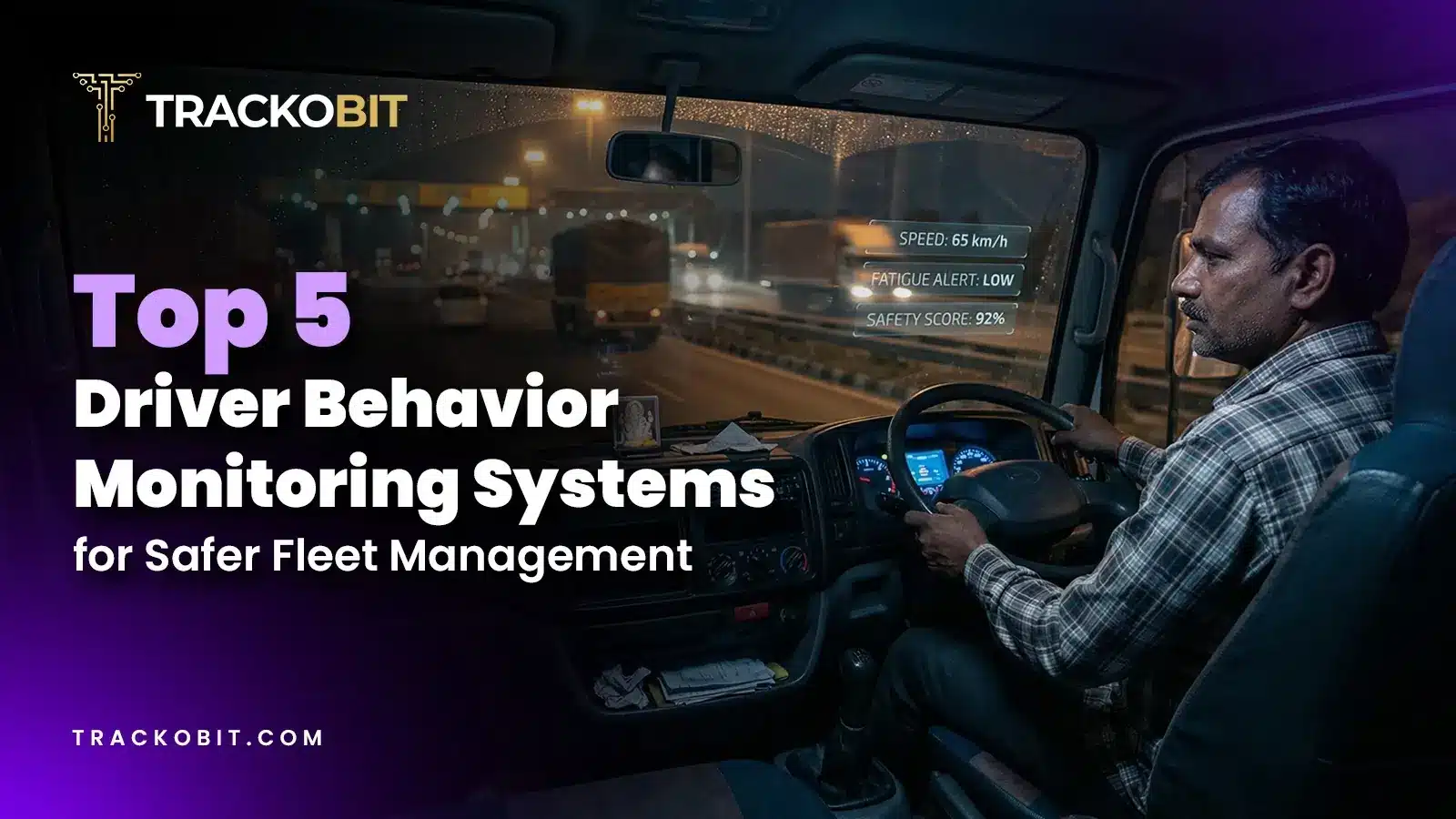
5 Best Driver Behavior Monitoring Systems for 2026
Tithi Agarwal February 23, 2026Having the best driver behavior monitoring system is a necessity as it helps you ensure driver safety and optimize operational…
-
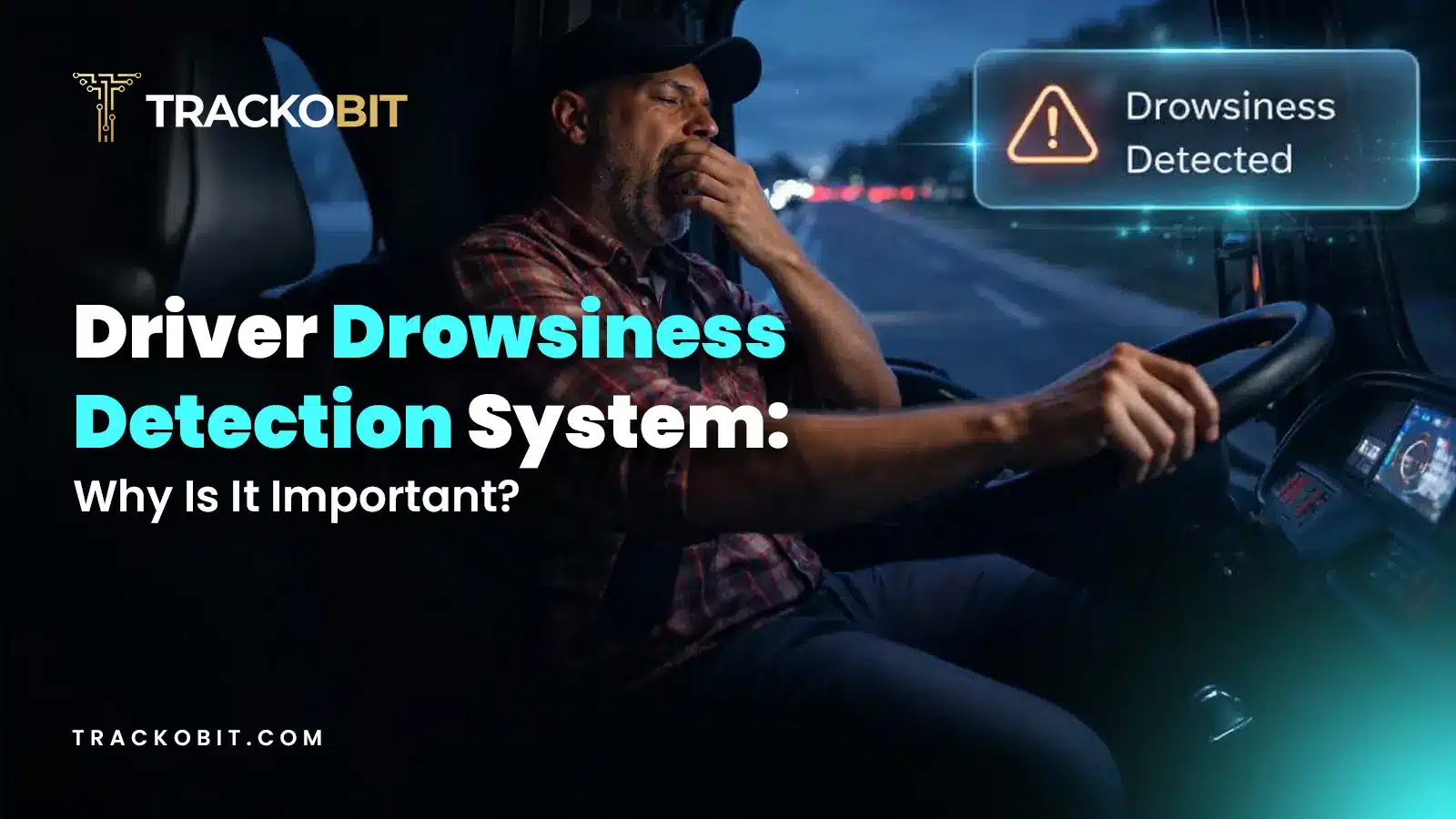
Why is Driver Drowsiness Detection System Important for Fleet Management?
Shemanti Ghosh February 4, 2026A driver drowsiness detection system is critical for fleet management. It helps prevent fatigue-related accidents and reduces operational risks through…
-
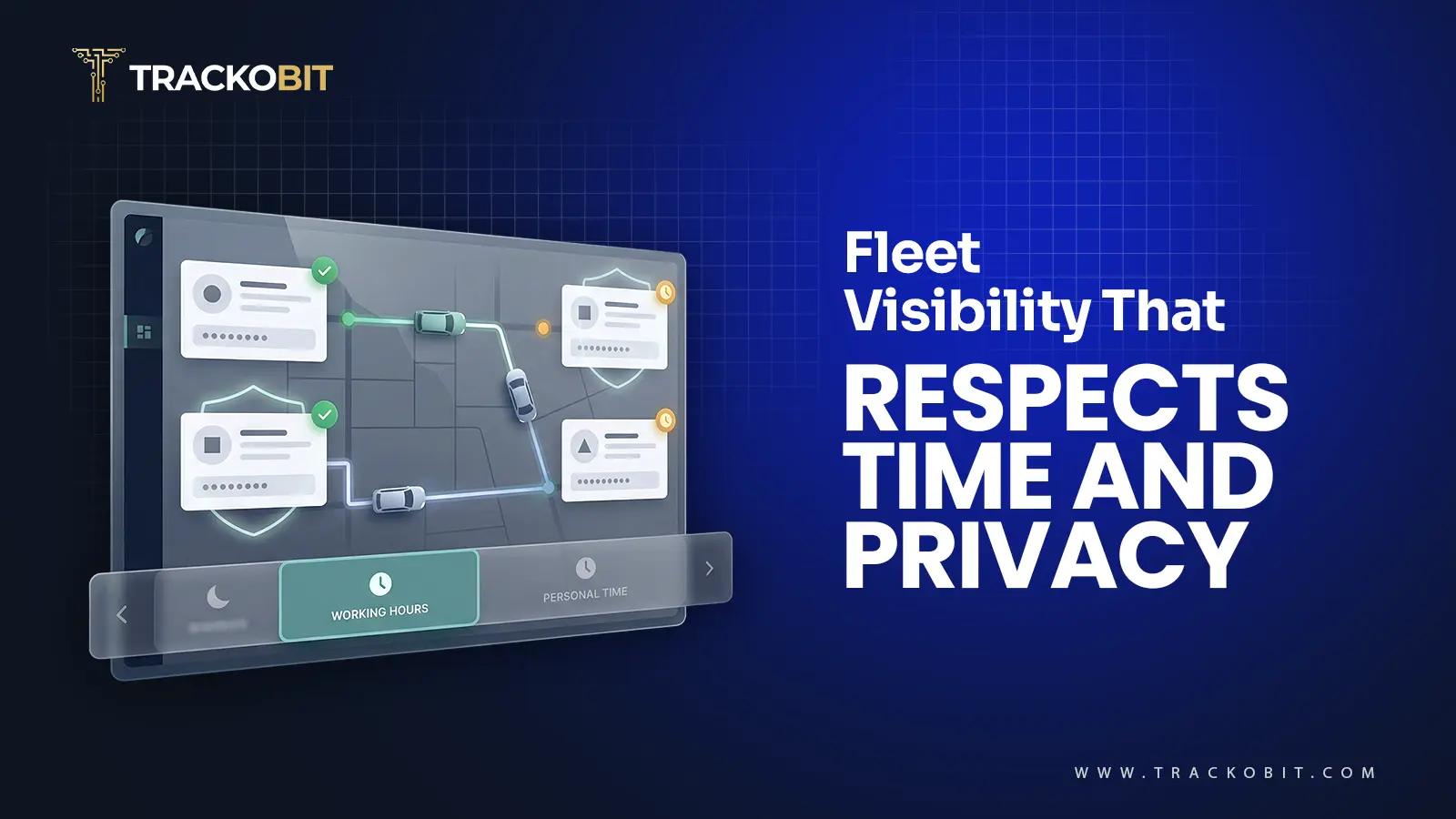
When Tracking Needs a Clock: Rethinking Fleet Visibility
Tithi Agarwal December 24, 2025Read on to understand why fleet tracking works better when it follows working hours. Because visibility should support operations, not…
-

What Makes TrackoBit’s Video Telematics Software Truly Next-Gen?
Shemanti Ghosh December 17, 2025TrackoBit’s video telematics software blends smart video intelligence with full server control. The result? Superior fleet reliability and safety.

Subscribe for weekly tips to optimize your fleet’s potential!
Your inbox awaits a welcome email. Stay tuned for the latest blog updates & expert insights.
"While you're here, dive into some more reads or grab quick bites from our social platforms!"Stay Updated on tech, telematics and mobility. Don't miss out on the latest in the industry.
We use cookies to enhance and personalize your browsing experience. By continuing to use our website, you agree to our Privacy Policy.


































